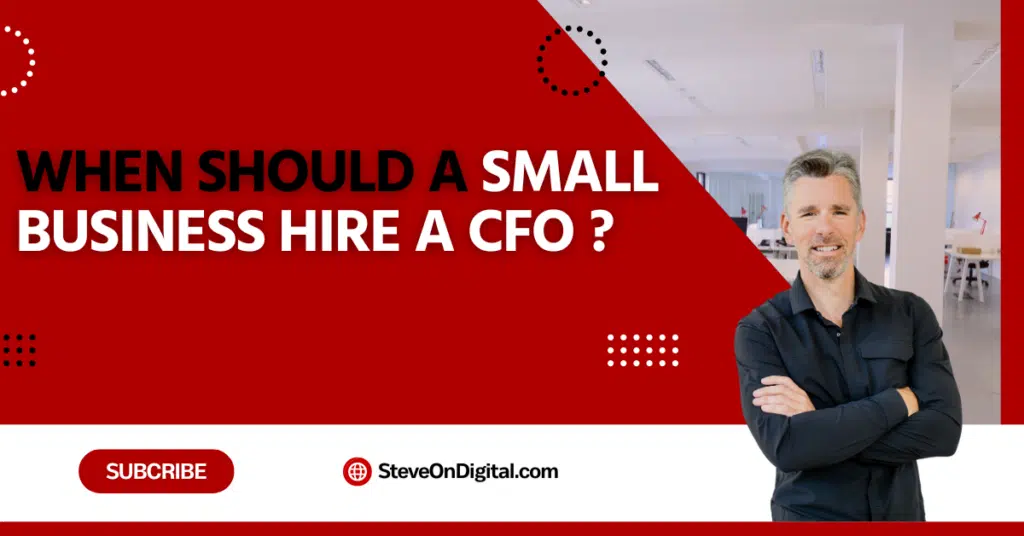When should a small business hire a CFO? – The Right Time

A small business should consider hiring a Chief Financial Officer (CFO) when it reaches a point where financial complexities and strategic planning demand expertise beyond basic accounting. This often coincides with rapid growth, expansion into new markets, increased regulatory requirements, or when preparing for significant financial events like fundraising, mergers, or acquisitions. Essentially, if the business owner finds themselves spending too much time on financial management rather than focusing on core business strategies, or if the current financial team is overwhelmed, it’s time to hire a CFO. The right CFO brings financial expertise, strategic insight, and leadership to navigate complex financial landscapes, ensuring the business not only survives but thrives in its competitive environment. Understanding The Role Of A CFO At the heart of financial leadership within a company lies the Chief Financial Officer (CFO). The CFO’s role is pivotal in not only ensuring the accuracy of financial reports and compliance with regulatory requirements but also in steering the company toward its financial objectives through strategic financial planning and analysis. Definition And Key Responsibilities Definition Of CFO: Key Responsibilities: Difference Between CFO, COO With Financial Acumen, Controller, And Bookkeeper The distinction between a CFO and other financial roles such as a COO with financial acumen, a Controller, or a Bookkeeper, lies in the scope and strategic nature of their responsibilities. While a COO might possess financial knowledge, their focus is more on the operational aspects of the business. A Controller oversees accounting and financial reporting, ensuring accuracy and compliance, whereas a Bookkeeper is responsible for recording financial transactions, maintaining financial records, and executing day-to-day financial tasks. Unlike these roles, a CFO brings financial expertise and strategic oversight, guiding the company through complex financial landscapes, identifying growth opportunities, and mitigating financial risks. They play a crucial role in strategic planning, investment decisions, and in shaping the company’s financial future. CFO Responsibilities And Comparison With Other Financial Roles Role Financial Planning Risk Management Strategic Decision-Making Accounting & Reporting Daily Financial Tasks CFO ✔️ ✔️ ✔️ ✔️ Occasionally COO with Financial Acumen Sometimes Sometimes Sometimes No No Controller ✔️ ✔️ No ✔️ No Bookkeeper No No No ✔️ ✔️ The Evolutionary Path Of SME Financial Needs The Hierarchy Of Financial Needs: From Transacting To Strategic Partnering Just as Maslow’s hierarchy of needs outlines the progression of human needs, SMEs experience an evolutionary path in their financial needs, from basic transaction processing to sophisticated strategic partnering. Initially, small businesses focus on fundamental financial transactions and record-keeping (accounts payable, accounts receivable, and maintaining financial records). As they grow, their financial needs become more complex, requiring advanced financial analysis, strategic financial decisions, and comprehensive financial planning to ensure sustainable growth and financial health. Identifying Where Your Business Stands On The Financial Hierarchy For small business owners, understanding where your business currently stands on this hierarchy is crucial. It involves assessing your current financial management practices, the complexity of your financial data, and your strategic planning capabilities. This evaluation helps in determining the right time to hire a CFO or enhance your finance team’s capabilities to address more sophisticated financial needs. The Illusion Of Fintech As A Complete Solution In today’s digital age, fintech solutions offer small businesses a range of tools for managing their financial operations. However, while these technologies can streamline processes and improve efficiency, they cannot replace the strategic insight and expertise a CFO brings to a business. Fintech can support day-to-day operations and financial reporting, but strategic financial decisions, risk assessment, and long-term financial planning require the human insight, experience, and expertise of a financial leader. When To Consider Hiring A CFO For Your Small Business Navigating the financial complexities of a small business can be a daunting task. As your business evolves, so do its financial needs, requiring more sophisticated management and strategic planning. Recognizing the signs that your small business is ready for a Chief Financial Officer (CFO) can be the catalyst for sustainable growth and financial stability. Signs And Triggers For SMEs Signs Your SME Needs A CFO Sign/Trigger Description Rapid Growth and Scaling Challenges Financial complexities increase, necessitating strategic planning and analysis. Complex Financial Decisions and Economic Uncertainty Strategic financial planning becomes crucial to navigate uncertainties. Internal Growth, Partnerships, Subsidiaries, and Acquisitions Expansion requires sophisticated financial analysis and planning. Fundraising, Capital Needs, and Investment Strategies Expertise needed in managing capital and developing investment strategies. Early vs. Timely vs. Too Late Hiring Recognize when financial management complexity exceeds current capabilities. Alternatives To A Traditional CFO For small businesses not yet ready to hire a full-time CFO, there are alternatives: CFO Hiring Options For Small Businesses Option Scope of Work Benefits Best Suited For Part-Time Accountant/Bookkeeper Basic financial management and reporting. Cost-effective, covers fundamental needs. Early-stage businesses with straightforward financial needs. Temp or Advisor CFO Strategic financial advice on a temporary basis. Strategic insight without long-term commitment. Businesses facing specific strategic challenges or transitions. Controller/Head Of Finance Manages accounting and financial reporting. Step towards strategic financial management. Growing businesses needing more than basic financial oversight. Finance Firm Partnerships Outsourced financial management. Access to comprehensive financial services. Businesses looking for expertise without hiring in-house. Fractional CFO CFO-level expertise on a part-time basis. Flexible, cost-effective strategic management. SMEs needing strategic financial insight but not ready for a full-time CFO. Determining The Right Time For Your SME What To Look For In A CFO As the financial backbone of a small to medium-sized enterprise (SME), the role of a Chief Financial Officer (CFO) goes beyond just crunching numbers. It’s about steering the company towards financial success and stability. From my journey as a business owner and entrepreneur, I’ve gleaned insights into what makes a CFO invaluable and how to ensure you’re making the right addition to your team. Essential Capabilities And Expertise For An SME CFO A CFO’s value lies in their depth of financial expertise and strategic thinking. Here are some critical areas to focus on: Questions To Ask When Building A Finance Function When Interviewing Candidates, Consider Asking: The Balance Between

